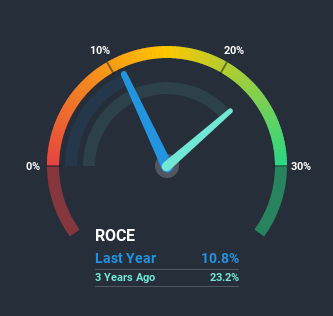- South Africa
- /
- Specialty Stores
- /
- JSE:WVR
What Do The Returns On Capital At HomeChoice International (JSE:HIL) Tell Us?
Did you know there are some financial metrics that can provide clues of a potential multi-bagger? In a perfect world, we'd like to see a company investing more capital into its business and ideally the returns earned from that capital are also increasing. Ultimately, this demonstrates that it's a business that is reinvesting profits at increasing rates of return. Although, when we looked at HomeChoice International (JSE:HIL), it didn't seem to tick all of these boxes.
Understanding Return On Capital Employed (ROCE)
Just to clarify if you're unsure, ROCE is a metric for evaluating how much pre-tax income (in percentage terms) a company earns on the capital invested in its business. Analysts use this formula to calculate it for HomeChoice International:
Return on Capital Employed = Earnings Before Interest and Tax (EBIT) ÷ (Total Assets - Current Liabilities)
0.11 = R446m ÷ (R4.5b - R356m) (Based on the trailing twelve months to June 2020).
Thus, HomeChoice International has an ROCE of 11%. That's a pretty standard return and it's in line with the industry average of 11%.
See our latest analysis for HomeChoice International

Historical performance is a great place to start when researching a stock so above you can see the gauge for HomeChoice International's ROCE against it's prior returns. If you want to delve into the historical earnings, revenue and cash flow of HomeChoice International, check out these free graphs here.
What Does the ROCE Trend For HomeChoice International Tell Us?
On the surface, the trend of ROCE at HomeChoice International doesn't inspire confidence. To be more specific, ROCE has fallen from 28% over the last five years. On the other hand, the company has been employing more capital without a corresponding improvement in sales in the last year, which could suggest these investments are longer term plays. It's worth keeping an eye on the company's earnings from here on to see if these investments do end up contributing to the bottom line.
On a side note, HomeChoice International has done well to pay down its current liabilities to 7.9% of total assets. So we could link some of this to the decrease in ROCE. Effectively this means their suppliers or short-term creditors are funding less of the business, which reduces some elements of risk. Since the business is basically funding more of its operations with it's own money, you could argue this has made the business less efficient at generating ROCE.The Bottom Line
Bringing it all together, while we're somewhat encouraged by HomeChoice International's reinvestment in its own business, we're aware that returns are shrinking. Additionally, the stock's total return to shareholders over the last five years has been flat, which isn't too surprising. Therefore based on the analysis done in this article, we don't think HomeChoice International has the makings of a multi-bagger.
One more thing to note, we've identified 1 warning sign with HomeChoice International and understanding it should be part of your investment process.
While HomeChoice International isn't earning the highest return, check out this free list of companies that are earning high returns on equity with solid balance sheets.
If you’re looking to trade HomeChoice International, open an account with the lowest-cost* platform trusted by professionals, Interactive Brokers. Their clients from over 200 countries and territories trade stocks, options, futures, forex, bonds and funds worldwide from a single integrated account. Promoted
Valuation is complex, but we're here to simplify it.
Discover if Weaver Fintech might be undervalued or overvalued with our detailed analysis, featuring fair value estimates, potential risks, dividends, insider trades, and its financial condition.
Access Free AnalysisThis article by Simply Wall St is general in nature. It does not constitute a recommendation to buy or sell any stock, and does not take account of your objectives, or your financial situation. We aim to bring you long-term focused analysis driven by fundamental data. Note that our analysis may not factor in the latest price-sensitive company announcements or qualitative material. Simply Wall St has no position in any stocks mentioned.
*Interactive Brokers Rated Lowest Cost Broker by StockBrokers.com Annual Online Review 2020
Have feedback on this article? Concerned about the content? Get in touch with us directly. Alternatively, email editorial-team@simplywallst.com.
About JSE:WVR
Weaver Fintech
Operates as a fintech company, provides financial services.
Proven track record with slight risk.
Market Insights
Community Narratives


Recently Updated Narratives

Constellation Energy Dividends and Growth

CoreWeave's Revenue Expected to Rocket 77.88% in 5-Year Forecast

Bisalloy Steel Group will shine with a projected profit margin increase of 12.8%
Popular Narratives


MicroVision will explode future revenue by 380.37% with a vision towards success


NVDA: Expanding AI Demand Will Drive Major Data Center Investments Through 2026



